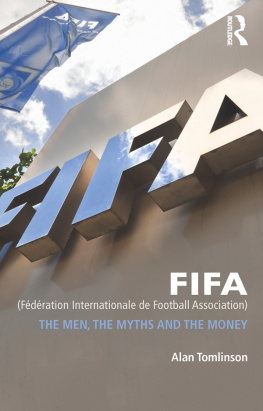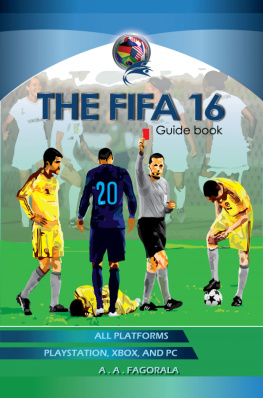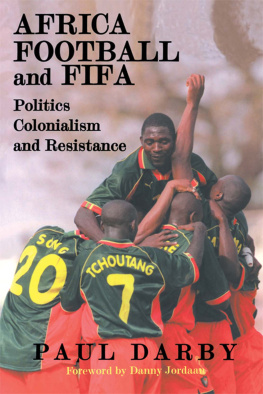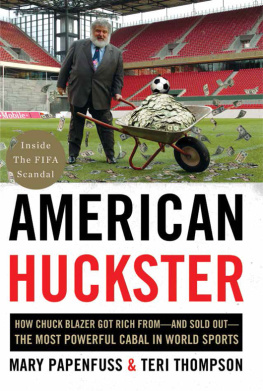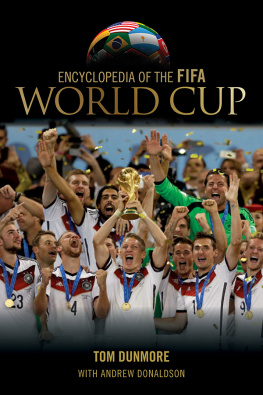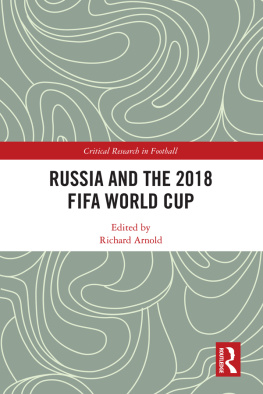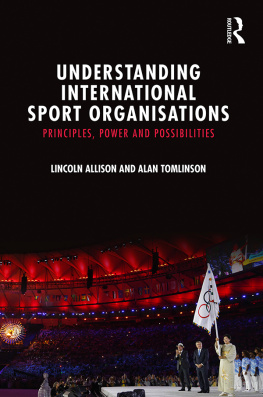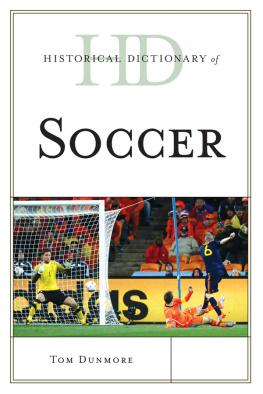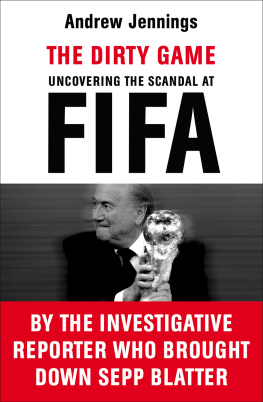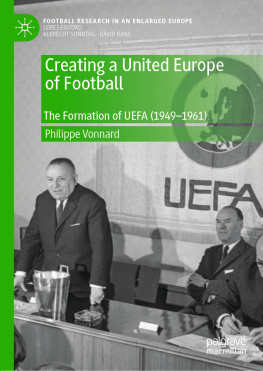FIFA (Fdration Internationale de Football Association)
Founded in 1904 by representatives of the sporting organisations of seven European nations, then expanding into the Americas, Asia and Africa, FIFA has developed into one of the most high-profile and lucrative businesses in the global consumer and cultural industry. In recent years, however, a series of crises have left the organization open to critique and exposure, and have created a soap-operatic narrative of increasing interest to the global media.
In this critical new account of one of the worlds most important sporting institutions, Professor Alan Tomlinson investigates the history of FIFA and the underlying political dynamics of its growth. The book explores the influence of the men who have led FIFA, the emergence of the World Cup as FIFAs exclusive product, FIFAs relationships with other federations and associations, the crises that have shaped its recent history, and the issues and challenges that are likely to shape its future. Particular attention is given to selected moments in the post-Havelange administration and the way in which FIFA, its current president Joseph Blatter and some close key colleagues have responded to and survived successive scandals. The book provides a foundation for understanding the growth and development of what is widely accepted as the worlds most popular sport; sheds light on the shifting politics of nationalism in the post-colonial period; and reveals the opportunistic drive for personal aggrandizement which is shaping an increasingly media-influenced and globalizing world, in which international sport was a harbinger of these trends and forces.
Fascinating and provocative, this is essential reading for anybody with an interest in soccer, sport and society, sports governance or global organizations.
Alan Tomlinson is Professor of Leisure Studies at the University of Brighton, UK. His most recent roles have been Director of Research & Development (Social Sciences) and Director of Postgraduate Studies (Arts). His research interests are in the sociology and socio-cultural study of sport and leisure cultures and the sociology of consumption, in particular the politics and culture of the sport spectacle. Recent books include the Dictionary of Sports Studies (Oxford University Press), The World Atlas of Sport (Myriad/New Internationalist), Watching the Olympics: Politics, Power and Representation (Routledge, edited with John Sugden), and Understanding Sport: A Socio-cultural Study, second edition (Routledge, co-authored with John Horne, Garry Whannel and Kath Woodward).
FIFA (Fdration Internationale de Football Association)
The Men, the Myths and the Money
Alan Tomlinson
First published 2014
by Routledge
2 Park Square, Milton Park, Abingdon, Oxon OX14 4RN
and by Routledge
711 Third Avenue, New York, NY 10017
Routledge is an imprint of the Taylor & Francis Group, an informa business
2014 Alan Tomlinson
The right of Alan Tomlinson to be identified as the author of this work has been asserted by him in accordance with sections 77 and 78 of the Copyright, Designs and Patents Act 1988.
All rights reserved. No part of this book may be reprinted or reproduced or utilised in any form or by any electronic, mechanical, or other means, now known or hereafter invented, including photocopying and recording, or in any information storage or retrieval system, without permission in writing from the publishers.
Trademark notice: Product or corporate names may be trademarks or registered trademarks, and are used only for identification and explanation without intent to infringe.
British Library Cataloguing in Publication Data
A catalogue record for this book is available from the British Library
Library of Congress Cataloging in Publication Data
Tomlinson, Alan.
FIFA (Fdration internationale de football association) /
Alan Tomlinson.
pages cm.
Includes bibliographical references and index.
1. Fdration internationale de football association--History.
2. Soccer--Management. 3. Soccer--Economic aspects.
4. Soccer--International cooperation. I. Title.
GV943.55.F43T65 2014
796.334--dc23
2013035463
ISBN: 978-0-415-49830-2 (hbk)
ISBN: 978-0-415-49831-9 (pbk)
ISBN: 978-0-203-71040-1 (ebk)
Typeset in Bembo
by Taylor & Francis Books
Contents
I first wrote on the history and the politics of FIFA in the mid-1980s, when there was little if any scholarly or academic material on the organization, at least from historical, sociological or political perspectives. This was a decade into Dr Joo Havelanges reign as FIFA president, and before Sir Stanley Rous, president from 19611974, died. Throughout these years, and up to 1998, the current incumbent of FIFAs presidential position, Joseph S. Blatter, was general secretary of the organization. I am grateful to FIFA and its personnel in the 1980s for answering telephone queries, sending me materials and, a further decade into my researches, welcoming me to FIFA House. I never managed to meet Rous, but since beginning work on his biography I have, supported superbly by his family descendants and his former personal assistant Rose-Marie Breitenstein, begun to feel that I have an authentic, and unprecedented, grasp of the character, aspirations and accomplishments of the man. I finally interviewed Havelange, with my then co-author Professor John Sugden, in Cairo, Egypt, in September 1997. I last saw him at close quarters walking around the Hotel Adlon Kempinski, just by Berlins Brandenburg Gate, during the 2006 mens World Cup; he was accompanied by a companion, and was window-shopping, stopping to peruse the hotels luxury goods. He was clearly comfortably in the bosom of his FIFA family eight years on from the end of his 24 years as president, though in 2013 he resigned his honorary presidency of FIFA just days before the publication of a report confirming his dubious financial conduct during the years of his presidency. I have observed Blatter for many years now, and spoken to him in hotel lobbies, bars and lounges, congress halls and press conferences. For several years I have written to him requesting an interview, and never been explicitly refused; his personal assistant explains that he is away, busy, on the move, immersed in urgent business, always not quite available. As I put the finishing touches to this book, I made one final effort to secure an interview with him, offering him the chance to tell his side of the FIFA story, to make the case for FIFAs claims, achievements and integrity.
Of course FIFAs story is not just about single individuals such as its presidents. But grasping their presidential styles, evaluating their institutional missions and personal ambitions is central to understanding how FIFA has developed and operated, particularly in the more contemporary period of increasingly globalizing and globalized media, and the commodification of the sporting spectacle. Havelange and Blatter have always been unerringly courteous to me, and it is appropriate to clarify this in these opening acknowledgements. At the same time, like many in their world, they can choose to cut you off like a fragile twig.
Conducting this research has required close attention to available documents, and I am eternally grateful to those who have made such documents available to me. This includes people in FIFA itself, and in all of the six continental confederations that are recognized by FIFA. Access to events, people and places has also been vital; for this, I thank FIFA and those confederations that generously afforded me accredited status for particular events, not primarily to see the game but to gain access to particular individuals whose lifeblood and career adrenaline flow through, and are sustained by, those events. I am especially grateful to all those who have, over the years, been willing to speak to me and share their experiences, observations and views on the world of football and FIFAs place in that world. Some people ask me particularly radio or television interviewers Why do you go on doing this kind of work? Why does understanding how FIFA works matter, next to the drama of the sporting encounter, the thrill of the game? This book looks to answer such questions, and for their encouragement and continuing support I am grateful to those who have found the topic of sufficient interest and importance to stimulate me to keep chasing the sources. This of course includes editors and publishers, and I owe special thanks here to Andy Lyons and his colleagues at

